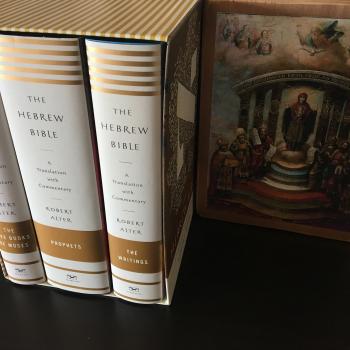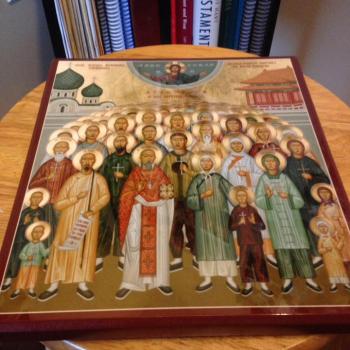The recent news about the forced retirement of Doug Green from Westminster Theological Seminary (WTS) has been intellectually stimulating for me. Of course, intellectual muffling is not supposed to be stimulating.
But I am a geographer.
When I read theologians, biblical exegetes, spiritual masters, and church historians, I’m often struck by how many of these people are in fact honorary geographers. Their scholarship is not merely done in the office for an audience of three (peer reviewers). Among the evangelicals, there seems to be a premium put on ‘life application,’ so much so that there is an NIV Application Commentary. Believing the Hebrew and Christian Scriptures to be completely inerrant, the objective, it seems, is to push the application of the Holy Bible into the practical work of holy living. Academic theologians thus participate in placemaking: their prescriptions for everyday life quite literally make the world into a certain kind of place.
Read this way, exegetical theology is always political. The problem is that few see it this way. That’s because biblical application is all about the individual. It’s just so-and-so’s life, no biggie. But that’s just the thing: an individual living according to principles derived from the Bible is engaged in placemaking insofar as a social vision is actively being made into a geographical reality.
For those who have read the relevant historiographies, anthropologies, and sociologies of evangelicals, the point that evangelicals are political creatures should be little surprise. As George Marsden recounts, American fundamentalism is a hodgepodge of Scottish empiricism, American exceptionalism, and revivalist enthusiasm; as SusanHarding points out, this translates into attempts to perform the biblical text in everyday life.
If, then, evangelicals are political creatures whose modus operandi is exegesis, then their political imaginaries deserve attention especially when controversy around someone like Doug Green strikes.
At face value, the controversy around Doug Green seems bizarrely idiotic. At its heart, after all, is the question of whether Green reads the Scriptures as intentionally literal or, in the big words that evangelicals are proud of using (so much for populism), christotelic. What this apparently means is that the Hebrew biblical authors did not have to be aware that they were writing about Jesus Christ, but whatever their intentions, the New Testament church could have read their Messiah into these texts. As others have explained, a christotelic hermeneutic is what originally got another celebrated biblical scholar, Peter Enns, in trouble at WTS. Reading the debate, the sense that one gets is that christotelic readings of Scripture trouble fundamentalists because they want the ancient Hebrew authors to have intended to speak about the Christ, in part to save the New Testament authors from the charge that they manipulated Scripture for their own theological purposes. As one biblical scholar I spoke with today put it, this desire for authors to have intentions is as much reading into the text as the whole christotelic thing – but of course, in a geographical analysis, that’s besides the point.
The point is that intentions matter. In fact, the road to exegesis is paved with intentions.
This is intellectually stimulating because one can now ask whyit is so important that intentions matter on the road of evangelical exegesis. While strict literal inspiration versus christotelism seems like splitting hairs, there is a vastly different social imaginary that undergirds both:
- A christotelic hermeneutic presumes that when we speak and write, we may not always know the full implications of what we say.
- A strict literalist inerrantist position assumes that we are always in charge of our intentions.
This has massively different implications for how citizens ought to communicate. The inerrantists would say that it’s important to take everything anyone says in democratic deliberation as exactly what they mean. The christotelic people would say that some citizens may be saying things about a big picture they don’t see. The trouble that the inerrantists might have with that is that it would be a lot harder to ‘trust’ that people are telling the truth. The trouble that the christotelic folks might have with that retort is that people might be telling the truth without knowing it.
And so on and so forth…
The point is that the social vision derived from exegesis has everything to do with how to listen to democratic deliberation. The question, then, is whether seminaries should be engaged in enacting one uniform social vision or whether multiple political imaginaries can co-exist among seminary faculty.
With recent moves among conservative seminaries, it seems that only the former is possible. One thinks, for example, of the consolidation of a gender complementarianism (read: conservatism) position at Cedarville University; one is reminded also of the move at Southern Baptist Theological Seminary to abolish tenure in favour of ideological conformity under the leadership of Al Mohler. One is also drawn to how certain seminaries have aligned with megachurches, such as Mars Hill Church, to provide seminary education to the laity, a project that suggests that theological literacy is part of a larger social experiment – that is, if ordinary Christians are equipped to articulate certain theologies in a certain way, what kinds of cities might they be empowered to construct?
In short, the road to exegesis is paved with intentions that are nothing less than political. Theologies, after all, form polities.
But not all is lost to ideological uniformity. Recently, I discovered that among my friends in Vancouver, many of us were in the same introductory integrative lecture course at Regent College, Christian Thought and Culture I, and I, I did not even know it. Held in Fall 2008, this course boasted 200 students and most of the Regent faculty, who were at that time engaged in a rather heated theoretical debate about the development of Christian doctrine. Most of my friends did not appreciate that the faculty brought this debate to the lecture floor. Our lack of appreciation will be soon be made geographical reality when we soon meet for drinks to celebrate our survival in this course.
Since Fall 2008, though, I have had the luxury of finishing two degrees, getting married, and engaging in scholarly debates of my own. In looking back on that Regent faculty debate, the description that it was politicalis as precise as things can be. On the one side were certain faculty members – usually the biblical scholars – who were convinced that the biblical texts were sufficient for the whole of Christian doctrine and that later doctrinal developments were nothing more than reading the implications of the text. On the other side were other professors – usually the systematic theologians – who understood theology as a constant creative work in progress so that the church could formulate doctrines that were not exactly intended by the biblical authors.
Sound familiar?
To my knowledge, no faculty member has been ousted from Regent because of this debate. In fact, I bring up this debate because of a certain article in Australia attributing two Member of Parliament’s conservatism to their ideological formation at Regent. That article’s claims slipped like sand through the author’s fingers because one could say that a place like Regent College presents a case study of precisely the opposite of the ‘ideological project’ approach to theological education. While we students thought that the faculty’s debate was silly and at times idiotic, hindsight suggests to me that the faculty was not so much debating heady theology as it was sussing out whether different Christian polities could co-exist in the same place. The result is that the students that I know from Regent tend to be given to the work of Christian ecumenism. A chunk of students influenced by the development-of-doctrine faculty have joined ecclesial communities that are very sacramental in character, yet when I talk to these friends, they retain a strong appreciation for their evangelical heritage. Some of this first bunch have in fact become Roman Catholic. On the other hand, some of the students who sided more with the biblical exegetes have given their lives to rigorous biblical teaching in churches, yet they will never take a potshot at the higher churches. Some in this second bunch are engaged in the very evangelical work of church planting. Instead of Regent College forming students for a certain ideological project, the theological vision that my friends on both sides of this debate have come to appreciate is one in which multiple ecclesial polities can co-exist in love. (DISCLAIMER: there were of course other elements of this debate of which I am critical. Allow me to save my bullets.)
I am thankful that I was able to witness this debate at Regent College, though unlike my friends, I have not pursued theological education to the point of earning any credentials. One side project in which this schooling has been helpful, though, is in reading theologians and exegetes as honorary geographers. Recently, for example, I had the pleasure of joining in a forum in the Bulletin for the Study of Religion on Sheffield exegete James Crossley’s Jesus in an Age of Neoliberalism; I am told that our exchange will be published later this year. I won’t give away my argument, but suffice it to say that when I read Crossley’s book, I was thankful that the Regent faculty had engaged in such a heated theological debate because I was already convinced that theological hair-splitting is not merely philosophically elitist, but is about competing political visions based on different theological narratives. On the same token, I was struck by how much of such political exegesis was at work during my doctoral fieldwork, especially in Hong Kong where theologians, pastors, and exegetes take to the pages of secular newspapers to debate how the Bible should move the church to participate in democratic activism for universal suffrage.












